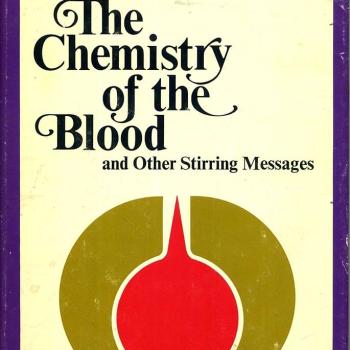Right, Wrong, and Necessary
It seems that many people think that in every situation of moral decision making there are two options and two only: right and wrong. By “right” I mean what one ought to do in order to be obedient to the highest moral law (whatever that may be). By “wrong” I mean what one ought not to do because it violates the highest moral law. Right and wrong. Black and white. And the only problem of ethics is figuring out what is “the right thing to do.”
Before I continue, let me say that I do not claim any originality for what I am about to say. But, then, I don’t think there is originality in philosophy, theology or ethics. Everything has been said somewhere by someone; originality is only in how it’s said (including by whom, in what manner, where and to what audience).
I believe that in some moral decision-situations there’s a third option besides “right” and “wrong”—”necessary.”
“Wait!,” I can hear someone saying. “If it’s necessary, it’s right.” That’s exactly my point—to say no. The moral category “necessary” participates in right and wrong but is not wholly either one.
I speak as a Christian from a Christian (not necessarily “the Christian”) point of view in ethics. Jesus, his character, way of life, and teachings form the highest moral law I know. Jesus said “Resist not evil” or “Resist not the evil doer” (Matthew 5:39). Therefore, it is always right to practice non-resistance toward evil. Precisely what non-resistance includes is another subject. We may not know exactly what all one can do while not resisting evil, but we know what ones can’t do while obeying Jesus’s command—use deadly force.
So, I am a pacifist somewhere along the sliding scale of pacifism. And yet many, probably most, pacifists would not count me among them.
When faced with a decision whether to use deadly force or not, I believe that, in this broken world, inhabited by monsters who rape, murder, torture and enslave children, one ought sometimes to use deadly force. But one ought not call it “right.”
Is it, then, “wrong?” Yes, according to the highest known moral law—Jesus’ teaching. On the other hand, it’s not simply wrong. Nor is it simply not right.
Someone is now asking “Isn’t this what Kierkegaard called the “teleological suspension of the ethical?” Perhaps. But what I am arguing is that it’s not a “suspension of the ethical” if we recognize “necessary” as an ethical choice alongside “right” but not identical with it.
In my taxonomy, then, “necessary” would include those moral decisions and actions which, in a given situation of tremendous evil, one must make and do even though they violate the highest known moral law. Thus, “necessary” participates in both “right” and “wrong” but is not simply one or the other.
What’s the practical implication of this distinction? There are, of course, many. But one is that when a person does what is right they can celebrate, give God all the glory, and receive congratulations (not credit) for it. God is the source of all good, so the person who does what is truly right ought always to give God all the glory.
But ought a person who has used deadly force, even if it was necessary, celebrate, give God the glory, receive congratulations? Given Jesus’ clear command, the answer must be no.
But ought a person who has used deadly force always be criticized or condemned for it? Given clear necessity, that would seem particularly problematic.
What, then, is the right response to necessary deadly force? Sorrow, regret, even repentance—trusting in God’s merciful understanding of our human condition.
In the current issue of the journal Religion in the News (15:1 [Fall, 2013]), published by The Leonard E. Greenberg Center for the Study of Religion in Public Life, editor Mark Silk refers to Basil the Great, “the fourth century Church Father who presided over a diocese in Asia Minor.” According to Silk, Basil (one of the three Cappadocian Fathers) “recognized that taking up arms might be necessary even as it remained morally problematic.” (p. 1) Silk reports Basil as saying that killing committed in the course of war should not always be classified as murders, but that persons who kill in war should be refused communion for three years “on the ground that their hands are not clean.” (p. 25)
The point here is not to agree with Basil’s recommendation; it is only to point out that the view I am expressing here seems to have been one held by at least some ancient Christian leaders. While Basil did not use the word “necessary” (so far as I can tell), his treatment of the issue seems to include the idea of an action that is neither right nor wrong but necessary.
In my opinion, Dietrich Bonhoeffer’s participation in the plot to kill Hitler (as reported by Eberhard Bethge in his biography of the German theologian) was, even to his own mind, neither “right” nor “wrong” but only “necessary.” And I agree that it was at least necessary to attempt it. This is, to my way of thinking, anyway, the solution to Bonhoeffer’s expressed pacifism combined with his knowing participation in a plot to assassinate the German dictator. (I choose to believe Bethge on that score, as I have already stated here earlier.) He did not shed his pacifism; he sacrificed it on the altar of necessity in this one case.
So what is the proper response to someone who has done what was necessary even though it was neither right nor wrong? Immediate forgiveness but not congratulations. They might be congratulated for their courage, but not for the actual act of use deadly force.
Now, obviously, a question immediately arises: How to know when a decision and the action based on it is necessary? I do not believe there is any litmus test for it. Casuistry will not work here, so there’s no point in going down that road. We cannot say definitely when a morally wrong decision and action is necessary and therefore justified (although still not “right”). We live in a tragic world and our human condition is mired in tragedy—until the Kingdom of God comes. Moral, ethical decision making and acting necessarily includes some risk. Casuistry cannot remove all risks, ambiguity or uncertainty, hard as it might try.
I suspect the only way to go about filling in the category “necessary” is to look at case studies. I mentioned Bonhoeffer above. Another one, at least in story form (I don’t know the historical facts but the story is supposedly based on reality), is that of Christian Sam Childers as portrayed in the movie “Machine Gun Preacher” by Gerard Butler. Given a specific set of circumstances, he found he had no choice but to use deadly force to protect innocent children from a band of guerilla fighters who were slaughtering whole villages and enslaving children.
When I examine Bonhoeffer’s decision and action and Childers’ (at least as portrayed in the movie) I find myself agreeing with what they decided and the actions they took but unable to call them “right.” I call them “necessary” and hope I would have the courage to make and take them as they did and trust God for forgiveness.
















